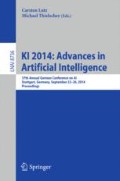Abstract
Induction of number series is a typical task included in intelligence tests. It measures the ability to detect regular patterns and to generalize over them, which is assumed to be crucial for general intelligence. There are some computational approaches to solve number problems. Besides special-purpose algorithms, applicability of general purpose learning algorithms to number series prediction was shown for E-generalization and artificial neural networks (ANN). We present the applicability of the analytical inductive programming system Igor2 to number series problems. An empirical comparison of Igor2 shows that Igor2 has comparable performance on the test series used to evaluate the ANN and the E-generalization approach. Based on findings of a cognitive analysis of number series problems by Holzman et al. (1982, 1983) we conducted a detailed case study, presenting Igor2 with a set of number series problems where the complexity was varied over different dimensions identified as sources of cognitive complexity by Holzman. Our results show that performance times of Igor2 correspond to the cognitive findings for most dimensions.
The work reported here was conducted by Jacqueline Hofmann in her bachelor thesis in Applied Computer Science at University of Bamberg, Dec. 2012.
Access this chapter
Tax calculation will be finalised at checkout
Purchases are for personal use only
Preview
Unable to display preview. Download preview PDF.
References
Baader, F., Nipkow, T.: Term rewriting and all that. Cambridge University Press (1998)
Burghardt, J.: E-generalization using grammars. Artificial Intelligence 165, 1–35 (2005)
Dowe, D.L., Hernández-Orallo, J.: IQ tests are not for machines, yet. Intelligence 40(2), 77–81 (2012)
Flener, P., Schmid, U.: An introduction to inductive programming. Artificial Intelligence Review 29(1), 45–62 (2009)
Ghallab, M., Nau, D., Traverso, P.: Automated planning: Theory and practice. Morgan Kaufmann, San Francisco (2004)
Hofmann, M., Kitzelmann, E., Schmid, U.: A unifying framework for analysis and evaluation of inductive programming systems. In: Goerzel, B., Hitzler, P., Hutter, M. (eds.) Proceedings of the Second Conference on Artificial General Intelligence (AGI 2009), Arlington, Virginia, March 6-9, pp. 55–60. Atlantis Press, Amsterdam (2009)
Holland, J., Holyoak, K., Nisbett, R., Thagard, P.: Induction – Processes of inference, learning, and discovery. MIT Press, Cambridge (1986)
Holzman, T.G., Pellegrino, J.W., Glaser, R.: Cognitive dimensions of numerical rule induction. Journal of Educational Psychology 74(3), 360–373 (1982)
Holzman, T.G., Pellegrino, J.W., Glaser, R.: Cognitive variables in series completion. Journal of Educational Psychology 75(4), 603–618 (1983)
Katayama, S.: Systematic search for lambda expressions. Trends in Functional Programming, 111–126 (2005)
Kitzelmann, E.: Analytical inductive functional programming. In: Hanus, M. (ed.) LOPSTR 2008. LNCS, vol. 5438, pp. 87–102. Springer, Heidelberg (2009)
Kitzelmann, E., Schmid, U.: Inductive synthesis of functional programs: An explanation based generalization approach. Journal of Machine Learning Research 7, 429–454 (2006)
Lebiere, C.: The dynamics of cognition: An ACT-R model of cognitive arithmetic. Kognitionswissenschaft 8(1), 5–19 (1999)
Muggleton, S., De Raedt, L.: Inductive logic programming: Theory and methods. Journal of Logic Programming, Special Issue on 10 Years of Logic Programming 19-20, 629–679 (1994)
Olsson, R.: Inductive functional programming using incremental program transformation. Artificial Intelligence 74(1), 55–83 (1995)
Quinlan, J.R., Cameron-Jones, R.M.: FOIL: A midterm report. In: Brazdil, P.B. (ed.) ECML 1993. LNCS, vol. 667, pp. 3–20. Springer, Heidelberg (1993)
Ragni, M., Klein, A.: Predicting numbers: An AI approach to solving number series. In: Bach, J., Edelkamp, S. (eds.) KI 2011. LNCS, vol. 7006, pp. 255–259. Springer, Heidelberg (2011)
Schmid, U., Kitzelmann, E.: Inductive rule learning on the knowledge level. Cognitive Systems Research 12(3), 237–248 (2011)
Siebers, M., Schmid, U.: Semi-analytic natural number series induction. In: Glimm, B., Krüger, A. (eds.) KI 2012. LNCS, vol. 7526, pp. 249–252. Springer, Heidelberg (2012)
Strannegård, C., Amirghasemi, M., Ulfsbäcker, S.: An anthropomorphic method for number sequence problems. Cognitive Systems Research 22-23, 27–34 (2013)
Summers, P.D.: A methodology for LISP program construction from examples. Journal ACM 24(1), 162–175 (1977)
Tenenbaum, J., Griffiths, T., Kemp, C.: Theory-based Bayesian models of inductive learning and reasoning. Trends in Cognitive Sciences 10(7), 309–318 (2006)
Author information
Authors and Affiliations
Editor information
Editors and Affiliations
Rights and permissions
Copyright information
© 2014 Springer International Publishing Switzerland
About this paper
Cite this paper
Hofmann, J., Kitzelmann, E., Schmid, U. (2014). Applying Inductive Program Synthesis to Induction of Number Series A Case Study with IGOR2. In: Lutz, C., Thielscher, M. (eds) KI 2014: Advances in Artificial Intelligence. KI 2014. Lecture Notes in Computer Science(), vol 8736. Springer, Cham. https://doi.org/10.1007/978-3-319-11206-0_3
Download citation
DOI: https://doi.org/10.1007/978-3-319-11206-0_3
Publisher Name: Springer, Cham
Print ISBN: 978-3-319-11205-3
Online ISBN: 978-3-319-11206-0
eBook Packages: Computer ScienceComputer Science (R0)

